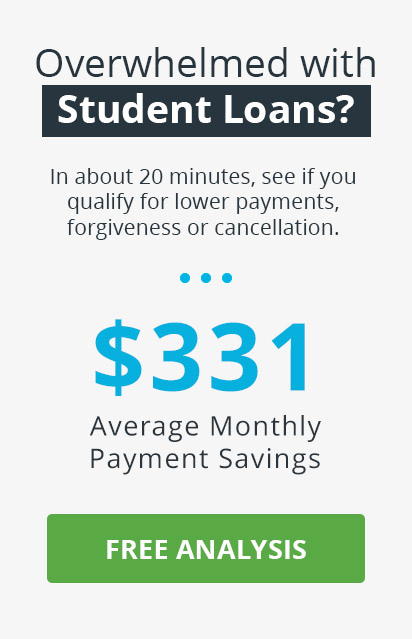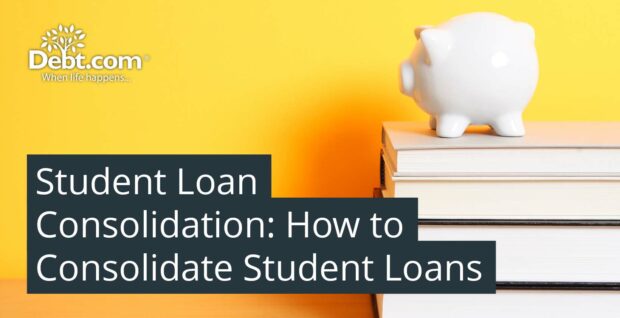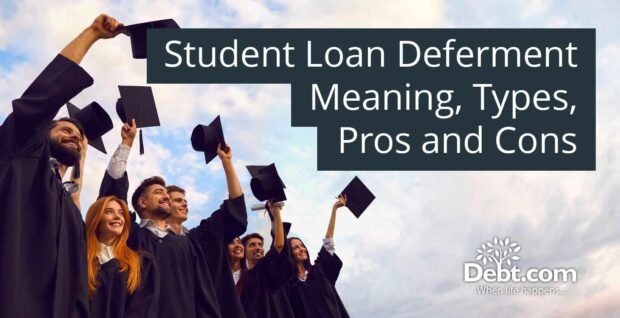
Private student loan consolidation is a financial approach that enables borrowers to combine multiple private education loans into a single loan with a new lender. The process simplifies the repayment process by merging various loans into one, thus reducing the hassle of managing multiple monthly payments. Borrowers potentially lower their monthly payments, though the arrangement leads to paying increased interest over the loan’s lifetime due to an extended repayment period by consolidating private student loans.
The interest rates for private student loan consolidation are based on the borrower’s credit score, meaning borrowers with improved credit since they first took out their loans are eligible for lower interest rates. For example, if a borrower has graduated, secured a stable job, and built a strong credit history, their enhanced creditworthiness results in a more reasonable interest rate when consolidating private student loans. It provides significant savings over time.
Borrowers must gather detailed facts about their current loans to start the process, including interest rates, balances, and repayment terms. Approach various lenders to get prequalified and compare rates and terms offered for private student loan consolidation. Choosing a lender that offers competitive rates and terms that correspond with the borrower’s financial goals is essential. The lender conducts a credit check to assess eligibility during the application process. The new lender pays off the existing loans promptly, leaving the borrower with a consolidated loan. Financial management is simplified, and terms are improved. Consolidating private student loans simplifies payments and reduces monthly costs, but it increases overall interest payments if the repayment period is extended.
Borrowers must carefully evaluate their financial situation and goals before deciding to consolidate private student loans, ensuring that the benefits outweigh the potential downsides. Contacting the current loan holders to negotiate lower interest rates before switching to a new lender is beneficial. The proactive step sometimes leads to better terms without consolidating with a new lender. Private student loan consolidation is a valuable tool for borrowers seeking to manage their debt more efficiently and possibly save money, provided they approach the process with a clear understanding of its implications and benefits.
Table of Contents
What is Private Student Loan Consolidation?
Private student loan consolidation simplifies a borrower’s financial management by reducing their monthly payments to one. The monthly payment is reduced, but there is an increase in interest throughout the loan.
Interest rates for private student loans depend on the borrower’s credit score. Getting a lower interest rate is possible if the credit score has improved with a new student loan consolidation. For instance, if a borrower graduated, secured a good job, and built a strong credit history, the credit score has increased.
Consolidating the loans with a different private lender results in a lower interest rate when the credit score improves by 50 to 100 points. Check with the current loan holder to see if they are going to lower the interest rate to keep the borrower’s business before looking elsewhere.
How does Private Student Loan Consolidation Work?
Private student loan consolidation works by requiring rolling multiple private education loans into a single loan, usually with a new lender. The method simplifies debt payment by combining several loans with a single monthly payment. Borrowers must review their current loan terms to consolidate private student loans. Borrowers must get prequalified to check eligibility without affecting their credit score, and shop for the best rates and terms from various lenders. They must complete an application, providing the required financial data. The new loan pays off the existing loans, and borrowers begin repayment under the new consolidated loan terms upon approval. The process lowers monthly payments and interest rates if the borrower’s credit score has increased since the initial loans were taken out.
What is the Importance of Private Student Loan Consolidation?
The importance of private student loan consolidation is to simplify the repayment process and save money for borrowers. Combining multiple private student loans into a single loan, frequently with a new lender, results in a single monthly payment rather than multiple, simplifying financial management. if the borrower’s credit score has substantially improved since the original loans were obtained, they are eligible for a lower interest rate, resulting in a reduction in monthly payments and the total interest paid throughout the loan. For instance, a higher credit score results in more favorable loan terms, and alternative strategies, such as home equity loans, provide stable fixed rates. Consolidation of loans with educational lenders offers specialized benefits, including competitive rates and flexible repayment options designed for students and recent graduates. Consolidating private student loans simplifies managing debt and provides substantial financial advantages.
Who Consolidates Private Student Loans?
Private student loans are consolidated by various financial institutions, including banks, credit unions, online lenders, specialized financial companies, and non-traditional lenders. Traditional financial institutions like Wells Fargo and local credit unions offer personalized services and lower rates for members. Online lenders such as SoFi, LendKey, CommonBond, and Earnest provide competitive rates and various repayment terms with an entirely online application process for convenience and speed.
Specialized financial companies, including Citizens Bank and Laurel Road, offer tailored benefits for graduates and students, such as flexible repayment options and competitive interest rates. Non-traditional lenders, like Credible and LendingTree, aggregate offers from multiple lenders, enabling borrowers to compare consolidation options and choose the best terms. These institutions assess borrowers’ creditworthiness, income, employment status, and other financial factors to determine eligibility and loan terms. Consolidating private student loans through these lenders simplifies repayment by merging multiple loans into one, lowering monthly payments and securing better interest rates, especially if the borrower’s financial situation has improved since the original loans were taken out.
What are the Eligibility Criteria for Private Student Loan Consolidation?
The eligibility criteria for private student loan consolidation are listed below.
- Credit Score: Consolidating private student loans requires a minimum credit score. In general, a minimum score of 650 is required; however, higher scores are preferable to secure more favorable interest rates and terms.
- Credit History: A clean credit history with no recent delinquencies, defaults, or bankruptcies is required. Lenders prefer borrowers with a solid financial history.
- Employment Status: Employment verification is frequently necessary. Many lenders require a minimum annual income, such as $24,000, to guarantee that the borrower repays the loan.
- Debt-to-income Ratio: Maintain an advantageous debt-to-income ratio. Lenders evaluate such a ratio to ascertain the borrower’s capacity to manage additional debt and current financial obligations.
- Graduation Status: Borrowers must have completed their education or be on the brink of it. The status guarantees lenders that the borrower has the capacity to repay loans and generate consistent income.
- Co-signer: A creditworthy cosigner is required if the applicant’s credit score or income does not satisfy the lender’s criteria. The cosigner is jointly accountable for the loan repayment.
- Loan Balance: Some lenders have minimum and maximum loan balance stipulations. Verifying that the aggregate quantity to be consolidated satisfies these criteria is imperative.
- Lender-Specific Requirements: Various lenders have distinct eligibility criteria, which include factors such as residency status, specific degree categories, and more. Examine the lender’s precise specifications.
What are the Best Private Student Loans to Consolidate?
The best private student loans to consolidate are listed below.
- RISLA: The Rhode Island Student Loan Authority (RISLA) is a nonprofit organization based in Rhode Island that offers student loan refinancing services nationwide. RISLA offers an income-based repayment program, which limits payments to 15% of a borrower’s income over 25 years if they are unable to afford their payments. The program and a 24-month forbearance option are unique in student loan refinancing. RISLA provides fixed interest rates ranging from 6.34% to 8.99% and loan terms of 5, 10, and 15 years. Loan amounts range from $1,500 to $45,000 annually, with a $150,000 aggregate limit per borrower. Eligibility criteria include a minimum income of $40,000 per year and a minimum credit score of 680, with most undergraduate students requiring a co-signer. Nurses benefit from 0% interest for 48 months following graduation. RISLA does not offer a co-signer release policy despite these benefits, charges late fees, and has a co-signer release option only after 24 months of payments, excluding periods during which income-based repayment is used.
- MEFA: The Massachusetts Educational Financing Authority (MEFA) is a nonprofit, state-based agency offering student loan refinancing nationwide. MEFA stands out for not requiring borrowers to have a degree, allowing borrowers who did not graduate to refinance their loans. MEFA does not charge any fees, including late fees. The agency provides interest rate estimates without a hard credit check, with rates ranging from 6.20% to 8.99%. Loan terms are available for 7, 10, and 15 years, with loan amounts ranging from $1,500 to the school’s certified cost of attendance minus aid. MEFA’s minimum eligibility requirements include a FICO score of 670 and an income of at least $24,000 per loan applicant. MEFA offers loan modification programs on a case-by-case basis for borrowers facing financial hardship although it does not have a specific forbearance limit. However, there is no co-signer release policy available.
- SoFi: SoFi offers a refinancing option for borrowers with an associate’s degree, making it accessible to a broader range of applicants. SoFi places no limit on the amount borrowers refinance, unlike many lenders. SoFi allows borrowers to refinance up to the total balance of their loans, which is beneficial for debtors with significant debt from professional degrees. SoFi’s interest rates range from 5.24% to 9.99% with autopay, and loan terms are available in 5, 7, 10, 15, and 20 years. However, SoFi’s rates are not the lowest in the market, and it does not offer co-signer release, although it provides a 0.125% interest rate discount on additional SoFi products like personal loans. SoFi allows borrowers to get an interest rate estimate without a hard credit check, and it offers member benefits and a forbearance program for students facing economic hardships, such as medical expenses, with up to 12 months total forbearance. The minimum credit score required is 650, and while SoFi does not disclose income requirements, a co-signer release is available after 24 payments. Late fees are applicable.
- Citizens Bank: Citizens Bank offers student loan refinancing without requiring borrowers to have graduated, making it accessible to a broader range of applicants. The bank provides co-signer release after 36 on-time loan payments. Interest rates range from 6.49% to 12.43%, with a potential discount of up to 0.50% for existing Citizens Bank customers. Loan terms are available for 5, 7, 10, 15, and 20 years, with loan amounts ranging from $10,000 to $300,000 for borrowers with a bachelor’s degree or less and up to $500,000 for borrowers with a graduate degree. Eligibility requires a minimum income of $24,000 for the borrower and co-signer combined, and borrowers with no degree or an associate’s degree must have made 12 on-time payments post-school. Forbearance options include three-month increments up to an undisclosed limit, and a loan modification program is available for up to 12 months for borrowers facing long-term financial hardship.
- Laurel Road: Laurel Road, an online-only lender acquired by KeyBank in 2019, offers unique benefits for borrowers in healthcare professions. Graduate students and borrowers pursuing bachelor’s degrees in health professions refinance as early as their final semester of school if they have an employment offer, while undergraduates in other fields refinance after 12 months. Borrowers release their co-signers after 36 monthly payments, and graduates refinance federal PLUS loans from their parents. The interest rates range from 5.69% to 10.20%, with loan terms available for 5, 7, 10, 15, and 20 years. Loan amounts start at $5,000 with no maximum, except for associate’s degree graduates, who refinance up to $50,000. Forbearance options include up to 12 months available in three-month increments, but no deferment option exists if borrowers return to school. Laurel Road does not disclose specific credit score or income requirements but charges late fees.
How to Consolidate Private Student Loans?
To consolidate private student loans, follow the steps listed below.
- Research suitable lenders. Identify lenders that offer private student loan consolidation. Consider factors such as the loan amount and repayment terms available and the competitiveness of their interest rates.
- Compare student loan refinance lenders. Shop around and compare lenders that refinance private student loans. Look into aspects like the interest rates they offer, any hardship programs, the requirement of a co-signer, and if they refinance loans from their specific school.
- Get preapproval from multiple lenders. Seek pre-approval from three to five lenders. Many lenders offer interest rate quotes without performing a hard credit inquiry. A borrower needs to provide basic information about their finances and credit status.
- Choose the right lender and loan. Comparison of preapproval offers helps borrowers select the best lender. Consider the interest rates, loan terms, and any additional benefits or programs they offer.
- Complete the application process. Fill out a formal application with the chosen lender. Provide detailed information about the current financial situation, including income and credit score, to determine eligibility.
- Pay off existing loans. The new lender uses the funds to pay off the existing private student loans once approved. It consolidates the loans into one with a new interest rate and repayment term.
- Start making payments on the new loan. Make monthly payments on the new consolidated loan according to the agreed-upon terms.
How Long does it Take to Consolidate Private Student Loans?
It takes approximately six weeks to consolidate private student loans. Problems with document verification, sluggish communication between lenders, or the borrower requiring more time to collect needed paperwork are all potential causes of delays. Federal student loans are provided by the federal government through the U.S. Department of Education, with terms and conditions set by law, primarily the interest rate. The borrower must file the Federal Direct Consolidation Loan Application and Promissory Note, which takes 30 minutes to consolidate federal student loans. Maintain payments on the current loans during the consolidation. The borrower starts making payments on the new consolidated loan once the servicer confirms that the loans are accepted for consolidation.
Give us 20 minutes. We’ll give you a personalized plan to reduce your student loans – possibly by hundreds a month.
What is the Application Process for Private Student Loan Consolidation?
The application process for private student loan consolidation is listed below.
- Research suitable lenders. Locate institutions that provide consolidation services for private student loans. Ensure that they furnish the necessary loan quantity and repayment terms. Compare the interest rates and supplementary benefits provided by a variety of lenders.
- Get multiple rate offers. Prequalify with various lenders to determine the interest rates at which borrowers are eligible. Determine whether the credit score is affected by prequalification. Choose the lender that provides the lowest annual percentage rate (APR).
- Pick the right loan term. Select the loan term that is most suitable for a borrower’s financial circumstances. Longer terms reduce monthly payments, but they result in higher interest rates. Higher monthly payments are necessary for shorter terms, but the total interest paid is reduced.
- Accomplish the application process. Send a formal application to the preferred lender. Provide any required financial details, including income and credit history. Await approval from the lender.
- Sign the loan documents. The loan agreement must be reviewed and signed upon approval. The current student loans are going to be repaid by the lender. The prior loans are replaced by the new consolidated loan.
- Begin making payments on the new loan. Execute the new loan terms by commencing monthly installments. Make payments promptly to avoid penalties and preserve a favorable credit score.
Are there any Penalties for Early Repayment of Consolidated Private Student Loans?
No, there are no penalties for early repayment of consolidated private student loans. Borrowers with student debt frequently develop concerns regarding penalties for repaying their loans early or late after completing their college education. There are no penalties for paying off student loans ahead of schedule, regardless of whether they are federal or private. It is a source of relief for borrowers committed to early debt repayment and have implemented sensible financial planning.
Penalties, on the other hand, are imposed for late payments. A borrower becomes delinquent, resulting in late penalties, even if they are only one day late with a payment. The delinquency is reported to credit bureaus if private student loans are 30 days late and federal student loans are 90 days late. It has a detrimental effect on one’s credit score and the interest rates obtainable for future loans, including mortgages and auto loans. Make payments in an opportune manner to prevent the occurrence of these supplementary charges and credit issues.
What are the Advantages of Private Student Loan Consolidation?
The advantages of private student loan consolidation are listed below.
- Single monthly payment: The repayment process is simplified by consolidating multiple private student loans into a single loan, consolidating multiple monthly payments into a single payment. It facilitates the management of finances and prevents the omission of payments.
- Potentially Reduced Interest Rates: Consolidating private student loans reduce interest rates, remarkably, if the borrower’s credit score has improved since the original loan was obtained. It decreases the overall interest paid throughout the loan.
- Enhanced cash flow: Consolidation has the potential to reduce the monthly payment, which enhances cash flow and facilitates the management of additional financial obligations and expenses.
- Repayment flexibility: Private lenders frequently offer consumers a selection of repayment terms, enabling them to select a plan that is more suitable for their financial circumstances. These terms encompass repayment periods that are either brief or longer.
- Fixed or Variable rates: Borrowers have the option of selecting either fixed or variable interest rates. A fixed-rate offers stability through consistent monthly payments, whereas a variable rate provides reduced initial rates, which is advantageous for borrowers who intend to pay off the loan promptly.
- Cosigner release: Many private lenders offer a cosigner release option, which allows the cosigner to be removed from the loan after a specified period of on-time payments. The option enhances the borrower’s financial independence and the cosigner’s credit situation.
What are the Disadvantages of Private Student Loan Consolidation?
The disadvantages of private student loan consolidation are listed below.
- Higher total interest paid over time: Lengthening the repayment term to make fewer monthly payments leads to paying more interest over the loan’s duration. The prolonged debt period impacts other financial aspects. However, spending more than the set monthly amount helps mitigate the issue if the budget permits.
- No guarantee of a lower interest rate: Consolidating with a Direct Consolidation Loan does not ensure a reduced rate, unlike refinancing, which offers lower interest rates based on an improved credit score. The interest rate is determined by averaging the rates of the current loans and rounding them up to the nearest one-eighth of a percent. It leads to a marginally higher interest rate than a borrower currently paying.
- Loss of progress toward federal forgiveness programs: Consolidating into a Direct Consolidation Loan results in the loss of progress on federal programs such as Public Service Loan Forgiveness (PSLF) or an existing income-driven repayment plan. Consult with the servicer before consolidating to prevent the erasure of years of progress toward forgiveness. Consolidating with a private loan results in the complete loss of access to these programs.
- Forfeiture of federal benefits: Consolidating federal student loans with a private loan results in the forfeiture of federal benefits, including flexible deferment and forbearance options and income-based repayment plans.
- Capitalization of unpaid interest: Any unpaid interest on the consolidated federal loans is added to the principal balance during consolidation. Interest then accrues on such a higher balance, increasing the total cost of the loan.
Can you Consolidate Private Student Loans into a Federal Student Loan Program?
No, you cannot consolidate private student loans into a federal student loan program. Federal student loan consolidation is a method exclusively combining multiple federal student loans into a single Direct Consolidation Loan, providing easier repayment by creating a single monthly payment rather than several. The procedure excludes private student loans, which are not transformed into federal loans. Refinance private and federal student loans with a private lender. Refinancing permits borrowers to roll multiple loans into one new loan, ideally with a better interest rate or more favorable terms. However, it turns any incorporated federal student loans into private loans, thus losing access to federal benefits such as income-driven repayment plans and loan forgiveness programs. Some lenders provide relief alternatives like forbearance or slightly reduced payments if debtors struggle with private loan payments.
Is it Possible to Consolidate Private and Federal Student Loans Together?
No, it is not possible to consolidate private and federal student loans together. Private student loans are unable to be consolidated with federal student loans in general, and the low interest rates on federal consolidation loans are not available for private education loans. However, there are several options for refinancing private education loans. Private student loan consolidation combines multiple private loans into a single loan, often with a new lender, simplifying finances by replacing several loans with one monthly payment. The method reduces monthly payments, resulting in higher total interest paid over the loan’s lifetime. Consolidating private student loans enables borrowers to secure a lower interest rate if their credit score has improved significantly since they took out the loans.
For example, graduates with good jobs and improved credit histories benefit from such. Get a lower interest rate by consolidating the debt with another private lender if the credit score has increased by 50 to 100 points. Contact the current loan holder to negotiate a reduced interest rate. Borrowers with significant home equity and confidence in repayment must consider using a fixed-rate home equity loan to pay off a variable-rate private education loan, thereby locking in the interest rate. Educational lenders specializing in student loans offer benefits such as flexible repayment options, competitive interest rates, and tailored services, making them a suitable alternative for consolidation. These lenders help organize finances and minimize total interest payments over the loan’s duration.
Are Private Student Loan Consolidation Eligible for Forgiveness?
No, Private student loan consolidation is not eligible for federal loan forgiveness programs. Federal loan forgiveness, such as Public Service Loan Forgiveness (PSLF) or Income-Driven Repayment (IDR) forgiveness, only applies to federal student loans. Borrowers lose eligibility for these federal benefits and protections when refinancing federal loans with a private lender. Private lenders offer no forgiveness programs similar to the federal government. Private consolidation offers other advantages, such as reduced interest rates and more accommodating repayment terms based on creditworthiness and financial standing, but not forgiveness. Consolidating the loans through a private lender is not the best choice if a borrower relies on federal forgiveness programs.
Private student loans are made available by non-government organizations (NGOs) such as internet lenders, credit unions, and banks. The private lenders’ terms and conditions govern these loans; unlike federal loans, they do not offer the same opportunities for student loan forgiveness. Private lenders are not required to provide any form of forgiveness or comparable incentive to their borrowers due to their independence from government oversight and the lack of a regulatory framework that applies to them.









